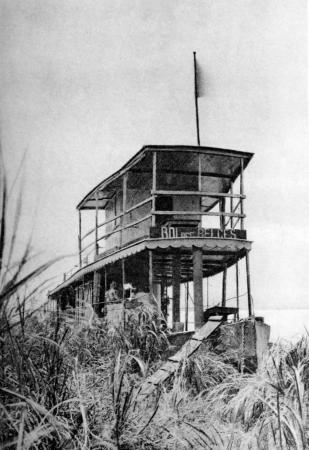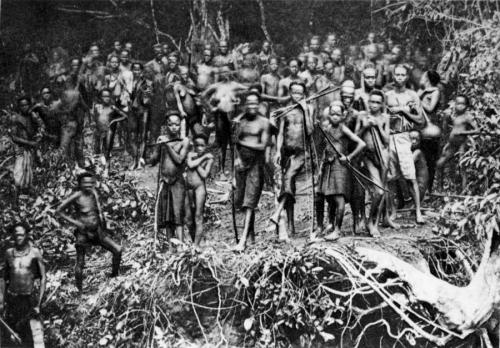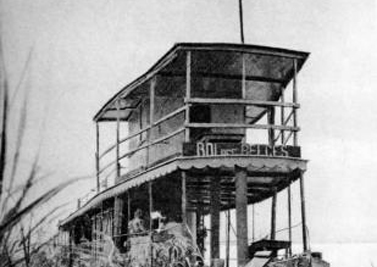
Imagine the Roi des Belges—a boat built to resemble the riverboat whose journey to the Congo in 1890 inspired Joseph Conrad’s Heart of Darkness—her bow jutting out from the roof of Queen Elizabeth Hall, as though about to fall or fly several stories down into the river Thames. Inside, the wood-paneled cabin holds a queen bed that ingeniously splits in two to allow for company and a deck for outside viewing or monitoring the weather. A built-in desk takes the place of the captain’s wheel and instead of navigational instruments, the walls are lined with books.
A collaboration between Artangel and Living Architecture (the social enterprise spearheaded by Alain de Botton), A Room for London is a boat-shaped structure built for members of the public to stay in and to host artists, writers and musicians throughout 2012. Each month, one of the project’s participants checks in for a short stay and creates a project to share with the world. The prompts are varied: musicians compose and broadcast “Sounds from a Room,” writers create “A London Address” and read it aloud for a podcast. Another group of artists, such as David Byrne and Geoff Dyer, create a piece inspired by the boat and surrounding views.
Dyer was perhaps ideal for this commission: Out of Sheer Rage, his biography of D.H. Lawrence, plays with different ways to represent reality. Out of Sheer Rage can be shelved in multiple categories: memoir, biography, history, or criticism. The main character of his novel, Jeff in Venice, Death in Varanasi, is named Jeff and has a tone that varies little from a Geoff Dyer memoir.
Genre norms don’t trouble Dyer, but artists’ representations of reality do. Dyer is a prolific critic, and photography, with its complex relationship with facts and history, is a frequent subject. When reviewing work by photographer Michael Ackerman, he reflects, “What we are seeing is the record not of a moment but of the way it lingers in the memory and becomes changed by its association with other moments, other memories.”
On July 16th, Geoff Dyer checked into the Roi des Belges. He had only one night to write his Conrad-inspired piece. From his desk, three windows framed what Conrad called “the biggest, and the greatest, town on earth” and the river Thames, where Heart of Darkness begins. And what was the experience like? Dyer answers, “Same as writing anything: impossible, then difficult, then enjoyable, and eventually satisfying.”
—The Editors
Like Death in Venice or The Great Gatsby, Heart of Darkness is not just a book but a modern myth—everyone has read it, even if they have not done so personally. The actual book is far stranger than accounts of it sometimes suggest. It’s a shame in a way that the book has become so famous as to dull our sense of this pervasive strangeness. Re-reading it now I find it scarcely less bizarre than when I plodded through it as a mystified seventeen-year-old (we were doing The Secret Agent for A-Level). What H. G. Wells wrote of Conrad’s earlier book, An Outcast of the Islands, also holds good for Heart of Darkness: “his story is not so much told as seen intermittently through a haze of sentences.”
Strictly speaking, the book is narrated not by Marlow but by someone listening to him and reporting what has been said so that we peer at the narrative river through a forest overgrown with quotation marks. Much of the time Marlow seems simply to be waffling on—even more extraordinary given what a short book it is, how little room there is for waffling.
We are perched up on a roof high above the river but the weather has been so terrible, for so long, that the boat feels like a submarine. The over-boat has become a U-boat, at risk of flooding courtesy of what’s above (rain), rather than the river below. My God—or by Jove, as Marlow likes to say—it seems like it could just float off the roof and slide into the river like a ship being launched up in Tyneside or Glasgow where they don’t make boats anymore and where the weather has probably been—inconceivable though this seems—even worse than here.
I’ll say this for the Thames though. At least it’s not always bursting its banks—unlike some rivers I could mention, or would if I could remember their names. That one in Tewkesbury? Or Hebden?
I always love it, in films, when a submarine breaks the surface of the water and the conning-tower hatch is opened. It’s not just the relief—the whoosh of sea air flooding through the cramped, feet-and-fart reek of the sardine corridor of das boot; it’s the fact of something coming into view, breaking through the barrier—yes, the film—separating the unseen from the seen.
It really feels like being on a sub when, with some difficulty—because of the Battle-of-the-Atlantic gale and the rain pressing down on it—I open the top circular hatch and slither out to take a look. We’ve broken the surface in the midst of the merchant (banking) convoy. It is—to shift geographies dramatically—a bit like climbing Everest in that no sooner have you got to the top than it’s time to go down again. Jeez, it’s like the Death Zone up there. And it isn’t just the rain and wind and typhoon that made it so difficult to open the hatch: the sky is like lead, like lead I tell you, pressing down like the implacable burden of adjectival insistence.
A-levels: the start of reading literary criticism—and how boring that seemed, what a comedown from the novels themselves. For Conrad we had to read The Great Tradition by F. R. Leavis whose analysis of Heart of Darkness was one of the first pieces of lit crit that I actually understood and learned from. It was still boring to read but I could see the point. Last year the art historian T. J. Clark told a story about Leavis who, if I remember rightly, may have taught him at Cambridge. Leavis, Clark said, was driven mad by the institution, by Cambridge: a Kurtzian figure in the backs of beyond, amid the much-punted Cam and the brooding flatness of the Fens.
Conrad has generated an impressive critical literature. Readings of Heart of Darkness necessarily consider not just the book itself but previous readings. The result is a kind of critical river. Conrad is also, of course, the source of a creative river—a source which, in turn, has its own origins further upstream, further back in time (as Marlow describes his journey). To what extent does the creative river double as a critical river and mirror?

Conrad and Céline:
From Journey to the End of the Night (1932):
“Out where the Company’s sending you, it’s deep in the bush. Very damp! … Ten days’ trip from here … First by sea … Then up the river […] the man you’re replacing at the post up there is a rotter … just between you and me … He simply won’t send us his accounts … Nothing we can do … we’ve sent him letter after letter … A man doesn’t stay honest long when he’s alone! … You’ll see. He’s written, says he’s sick … Big deal! I’m sick too!” [p. 111]
“I tried here and there to get a little more information, a few facts to go by. Because what the director had told me about Bikomimbo seemed incredible. Apparently the place was an experimental trading post, an attempt to penetrate the bush, at least ten days’ journey from the coast, isolated in the midst of the natives and their jungle, which had been described to me as an enormous reservation, crawling with animals and diseases.” [p. 125]
Pacing around is usually part of the choreography of anxiety but it can also be an indicator of pleasure: you don’t want to be anywhere else but are too excited and full of anticipation to sit down. So, just in case you’re on Waterloo Bridge and see a thin figure pacing around the boat-house, rest assured—he’s not in any kind of anguish, he’s very happy to be here.
Conrad and Fitzgerald (Marlow and Carraway):
Fitzgerald was a far more diligent reader, absorber and learner than is often assumed. He aspired to “do the wide sultry heavens of Conrad,” he admired Nostromo (one of the most boring novels in the language) and hoped, in Tender is the Night, to achieve the “lingering after-effects” that he associated with Conrad. Is Conrad there in The Great Gatsby; that is to say, is Marlow’s voice there in Carraway’s?
“Gatsby turned out all right in the end.” I hear a kind of negative echo of Marlow in this. Negative in the sense of positive, turned on its head.
“We were wanderers on a prehistoric earth, on an earth that wore the aspect of an unknown planet. We could have fancied ourselves the first of men taking possession of an accursed inheritance, to be subdued at the cost of profound anguish and of excessive toil.”
That’s Marlow (whose journey takes him into “a towering multitude of trees”). And this is Carraway (whose lawn, after a rain storm, is full of “swamps and prehistoric marshes”):
“… gradually I became aware of the old island here that flowered once for Dutch sailors’ eyes—a fresh, green breast of the new world. Its vanished trees, the trees that had made way for Gatsby’s house, had once pandered in whispers to the last and greatest of all human dreams; for a transitory enchanted moment man must have held his breath in the presence of this continent, compelled into an aesthetic contemplation he neither understood nor desired, face to face for the last time in history with something commensurate to his capacity for wonder.”
“The Secret Sharer”:
Staying in a room that is not your own in your home city: the fact that it feels so odd is a sign of how settled my life has become. In my younger and more vulnerable years I often used to wake up in other people’s flats, either because I’d missed the last tube and didn’t want to fork out for a taxi or, less often, because a romance had got underway. It’s great being here but whereas, in another city, I would be impatient to get out and experience the streets, the cafés, the shops, I am gripped by exactly the opposite sensation: that every minute spent outside the boat is time wasted. Also the slight fear that if I walked around the South Bank I might bump into someone I know. Why fear? Because this feels illicit, as if—even though I’m here on my own, waiting for my wife, as it happens—I’m having an affair (for which this is the perfect venue). Also, because it’s my town out there, I’m conscious of the possibility that the person I bump into might be myself.
Conrad and Borges:
Last two lines of Borges’s poem, “Manuscript found in a book of Joseph Conrad”:
“The world is a few vague tepid observations.
The river is the original river. The man, the first man.”
Back in the days when the motor car was seen as panacea rather than intractable problem, did no one consider, concreting over the Thames, turning it into a curving, twelve-lane freeway—with bridges over or tunnels under?
Conrad and David Lodge:
The fun moment in The British Museum is Falling Down when a bunch of Chinese students are convinced that the desk Adam Appleby is working at in the British Library is the very one where Marx spent many years researching Das Kapital. Adam’s response: “Mr. Marx, he dead.”
It’s only five o’clock but already “beastly, beastly dark.” The worst summer in living memory has generated a kind of contentment. None of the torment that usually goes with summer: will the weather be nice on the special weekend of … the wedding? the festival for which we bought tickets ages ago? the picnic with friends? (A few more summers like this and the word “picnic” will not just atrophy from lack of use, it will disappear from the language. People will have to consult dictionaries to look up its meaning when they come across it in novels (“(picnic, lightning)”).)
Conrad and Kapuscinski:
A couple of years ago, right beneath where we are staying, I chaired a celebration of the life and work of Ryszard Kapuscinski with Jonathan Miller and Michela Wrong (In the Footsteps of Mr Kurtz). A master class in failed chairing, the event took on a crazed momentum of its own and became a Kapuscinski-dissing session. Elaborating on the argument advanced by John Ryle in a review of The Shadow of the Sun Wrong insisted, essentially, that Kapuscinski’s methods were unreliable and unsound. All of which is a prelude to mentioning a surprising lacunae in Kapuscinski’s translated writings: no mention, that I can recall, of Conrad whose name only crops up once in Artur Domoslawski’s new biography of Kapuscinski. How strange that Kapuscinski did not write more about Conrad as guide and inspiration, in the way that he wrote about Herodotus. It is almost—to use the Marlovian term—inconceivable that Conrad did not play a part in persuading him to lead the life of adventure and literature that he did.
Our epic non-summer has ended up being as stress-free as a season in Tuscany. We are resigned. We don’t have to fret over whether to take umbrellas: madness to leave home without an umbrella or a rain coat. For the first time ever in England I have seen people cycling with umbrellas. If Darwin’s theory of evolution is correct then umbrellas will eventually start growing out of people’s heads, like antlers from deer. We live in July as if in November with extra hours of daylight (so-called) thrown in. One half of wisdom is not fretting about what you can’t change so it’s good to have made peace with the weather. The feeling of contentment merges into an inkling that one wouldn’t mind no longer being alive, that it would be a relief—to put it mildly—not to have to endure such meteorological punishment. Because this “contentment” is only an inch from suicide, from chucking oneself in the Thames. It’s also a resignation that could erupt into its opposite, into a scream: not in Munchian reds and purples, just a dreary charcoal smear of gray from the brolly tide of Waterloo bridge—and not a scream at all, more like a whisper, a cry that is no more than a breath.
Conrad and Coppola:
The genius idea of Apocalypse Now: a retelling and relocation of Heart of Darkness to the Vietnam war, changing the Congo for the Mekong, and casting Brando, the great method actor, as Kurtz (even if that ended up being the worst thing about the film). Coppola’s wife made a documentary about the making of the film. A director’s cut of the film was later released. What one longs to see, however, is footage of Harvey Keitel as Willard before he was sacked and replaced by Martin Sheen. The mythology swirling around this lost performance somehow creates the illusion that it is Keitel, not Brando, whose method was unsound.
We are as forgiving of the weather as fans of a consistently losing football team: month after month of rain, wind and cloud followed by a few afternoons of sun and we are not only happy but full of optimism, confident that things might improve that— in football terms—we might stay up. By late august we will be mired, as usual, in a relegation battle, pinning our hopes on an “Indian summer,” resigned to going down but already—in spite of the evidence of years—looking for speedy promotion back to the premiership of sun next June. A recipe for despair.
Conrad and Amis (times two):
Martin Amis somewhere offers an excellent piece of advice on the limits of description. If something is “indescribable”, he says, then you’re better off not describing it. A devastating critique of Conrad’s method in Heart of Darkness?
Maybe Conrad is there, glaring in on Keith Talent like the low and blinding sun at the end of London Fields: “Horrorday” with its “horror clock,” “horrorteeth,” “horrorzip,” “horrorleaves,” and “horrorshard,” and so on.
All very well looking out of the window, seeing the green lasers come on beneath the bridge at midnight but the cumulative effect of the familiarity of the outside world (London) and bad weather is … a frustrated urge to watch TV.
Conrad and Dylan:
Allen Ginsberg in the liner notes to Desire: “D. says he’s reading Conrad storyteller, so hear continuous succession of Panama Hat Necktie details, exploding boilers & characters disappearing in tornados.” Except it turns out that, at the end of the song (“Black Diamond Bay”), Dylan is just watching a news story on TV—which he turns off and goes to get another beer.
The frustration of staying somewhere nice for just one night: always an incomplete experience, a twenty-hour day: 3:00 (check-in) till 11:00 (check-out).
The moment I check out I am my normal self again, one of the people I had been watching, hurrying across a bridge in the rain that has somehow turned to sun.
Learn more about Artangel and A Room for London.
Geoff Dyer is the author of Jeff in Venice, Death in Varanasi and three previous novels, as well as seven other non-fiction books. Dyer has won the Somerset Maugham Prize, the Bollinger Everyman Wodehouse Prize for Comic Fiction, a National Book Critics Circle Award, a Lannan Literary Award, the International Centre of Photography’s 2006 Infinity Award for writing on photography and the American Academy of Arts and Letters’ E.M. Forster Award. In 2009 he was named GQ’s Writer of the Year. He lives in London.
